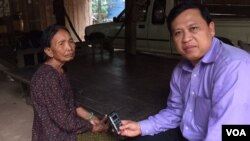Cambodian prosecutors at the Khmer Rouge tribunal have found themselves once again at odds with their international counterparts, this time over whether the court has jurisdiction to take to trial Im Chaem, a former district governor in the ultra-communist regime.
In a statement released on December 6, the co-prosecutors said they were only granted a remit to prosecute high-ranking members of the regime and those most responsible for decision-making.
However, the Cambodian prosecutors said this meant Chaem’s was “not in the personal jurisdiction of the court to be subject to trial,” while the international prosecutors argued her case would fall within the latter category as she was one of “those most responsible” for the crimes against humanity committed in Democratic Kampuchea.
Observers of the tribunal agreed with the international side.
Latt Ky, a human rights worker with local NGO Adhoc, said there was widespread agreement that the court should “bring those most responsible to face the law.”
Youk Chhang, director of the Documentation Center of Cambodia, said the public should continue to support the justice process and provide “freedom and independence to the court to make proper judgments in alignment with the evidence.”
The international prosecutors explained in the statement that Chaem had played an important role in the regime and had been selected by the party to lead a “cleansing” campaign in the northwest of the country.
They claimed her crimes ranged from murder, mass killing, enslavement and detention, to torture and persecution and included other acts such as forced marriage, rape and enforced disappearances.
Sap Sam Ath, Chaem’s nephew, declined to comment.
Chaem’s lawyer, Bit Seanglim, said he supported the finding of the Cambodian prosecutors.
Khmer Rouge Tribunal Split Over Possible Trial of Former Regime Governor
- Hul Reaksmey
- VOA Khmer

In a statement released on December 6, the co-prosecutors said they were only granted a remit to prosecute high-ranking members of the regime and those most responsible for decision-making.
PHNOM PENH —






